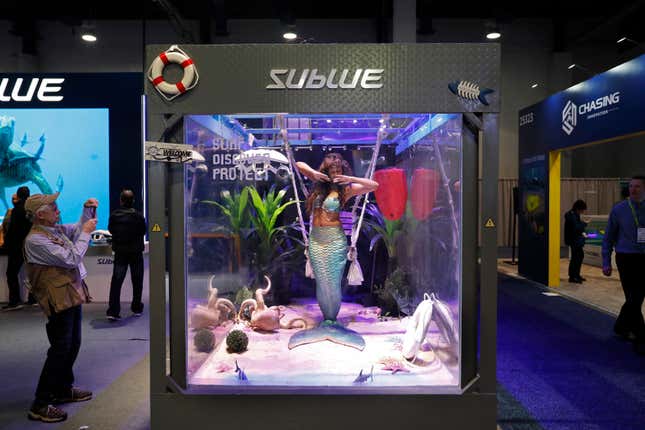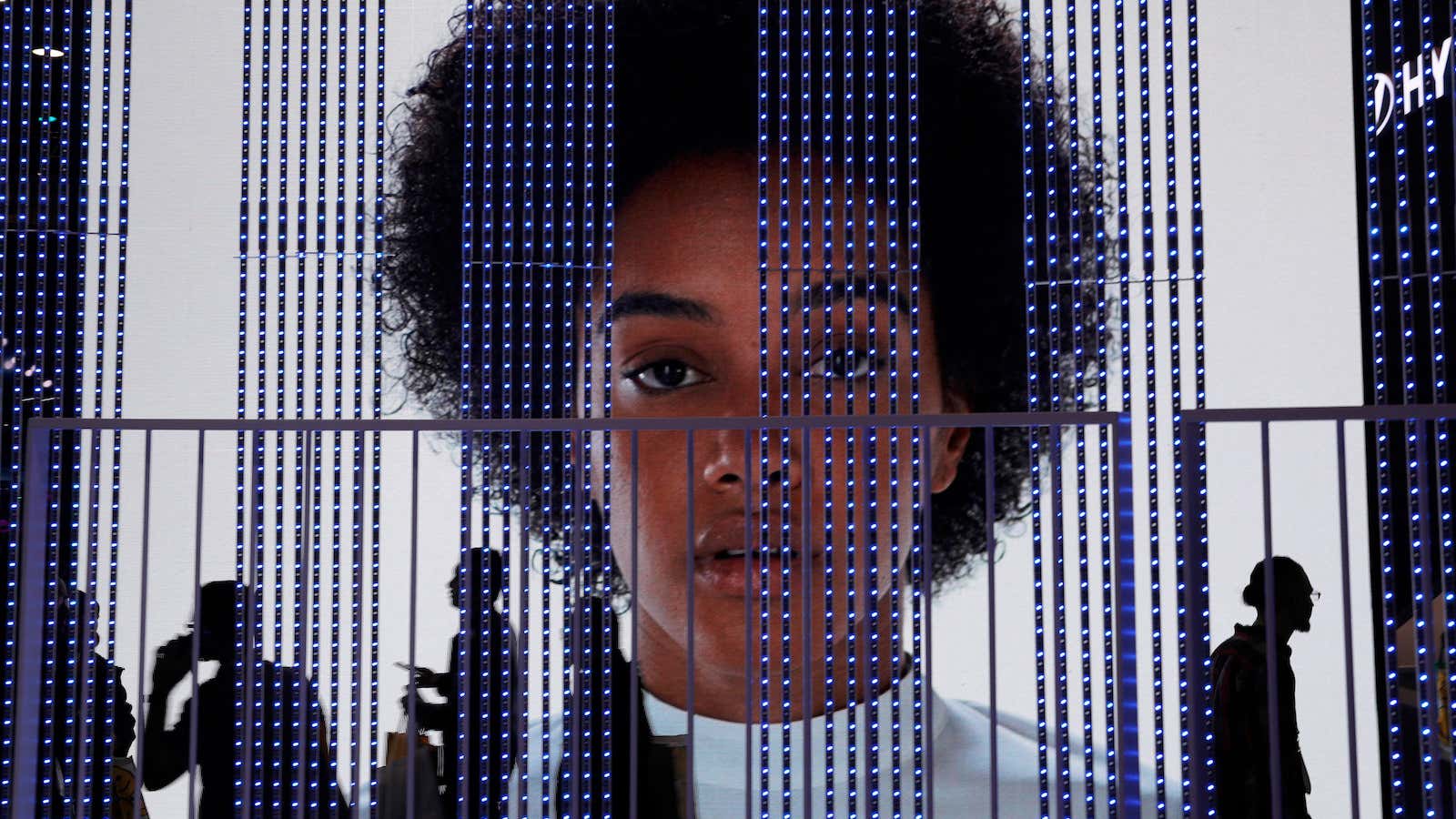Gender equality in the technology sector is by some measures more dismal now than it was in the mid-1980s. And when it comes to the Consumer Electronics Show in Las Vegas, the world’s largest technology trade show, even the smallest inequalities become multiplied and magnified.
Last year, CES received a particularly heavy wallop from the industry when it failed to include any women in its lineup of keynote speakers for a second year in a row, and didn’t seek out speakers from any other underrepresented minorities either. “As upsetting as it is, there is a limited pool when it comes to women in these positions,” Karen Chupka, senior vice president of the Consumer Trade Association (CTA), the organization that puts on CES, said at the time. “We feel your pain. It bothers us, too.” In response, the global chief marketing officer at HP encouraged men to boycott the event, #CESSoMale began trending, and Twitter organized an all-female panel in protest.
This year, the organizers have tried to turn the ship around (and when more than 180,000 people attend CES, that’s 78 Titanics). Half the featured speakers are women and/or people of color. CTA announced that it would be investing $10 million in venture capital firms focused on supporting diverse startups. Even GenderAvenger, the online community that sounded the bugle on last year’s show of inequality, gave this year’s lineup its seal of approval.

That doesn’t mean CES 2019 has been without gender-related controversy. Instead of scantily dressed “booth babes”—which the CTA outlawed in 2013—there were lycra-clad acrobats and models working out on smart-connected exercise bikes. And a female sex toy had its innovation award revoked for being “obscene,” despite the fact that a sex doll was included on the show floor last year.
To discuss CES’s efforts to right the industry’s wrongs, we sat down with Tiffany Moore, CTA’s senior vice president of political and industry affairs. A woman of color whose mother instilled her with a love of computers, Moore spoke about the organization’s attempts to diversify the conference—and the tech ecosystem writ large. This conversation has been lightly condensed and edited.
Quartz: You’ve said that gender diversity and inclusion is important to CES. Do you have any stats on women’s involvement this year?
Tiffany Moore: We had some amazing keynotes, including [Advanced Micro Devices CEO] Lisa Su and Ginni Rometty from IBM, who returned to CES. On all of our different stages and panels this year, more than 35% are women and people of color.
Last year you had a lot of pushback when you announced an all-male speaker lineup. What did you learn from that in the way you approached the lineup this year?
We were very intentional about how we moved forward. We also wanted to bring new media and be intentional about our call for speakers and calling out the importance of diversity. We have an amazing lineup, and I’m excited that people get to see what we’ve been working on.
And what about on the floor?
We have incredible companies that are exhibiting—more than 4,500 of them. One of the most exciting places is Eureka Park, [a section of the convention] where we probably have 500 startups. As a matter of fact, that’s where I’m headed to after this. We’re working out how to provide more opportunities for more women and diverse founders to showcase at Eureka Park.
There are so many countries represented at Eureka Park—La French Tech has almost a third of it, it seems. But what about developing countries? They seem underrepresented.
It’s great to see the country pavilions. This is the global stage for innovation. On the CTA side, we have an international scorecard where we’re ranking countries on innovation. We actually rate diversity as a part of our international scorecard. Then there’s the openness to new business models and the environment—you can’t innovate without having basic needs met. We’re looking at how countries are treating drones and what their self-driving car policies are. Are they open to new business models, like ride sharing and home sharing? These are the things that we try to keep a pulse on. It provides an opportunity for us to go, visit, and engage in different countries, talk to them about innovation, and bring them to CES, but also create great innovation in their countries. It’s created a wonderful dialogue, and we look forward to having more countries represented.
I want to double back to the lack of gender equality on the show floor. What do you think the biggest barriers are for female founders? And what responsibility does the CTA and CES have in trying to create a better ecosystem?
Well, it’s interesting. Yesterday I moderated a panel on diversity in tech, and one of the panelists was Elizabeth Gore from Alice, which is an online platform for entrepreneurs and startups that’s geared toward women and people of color. She talked about the dire numbers when it comes to VC funding for women founders. So first you have to have the funds.
One of the most important announcements we made this year was having Gary Shapiro, our president, on the keynote stage announce that CTA will invest $10 million in venture firms and funds that support women, diverse founders, and also diverse leadership teams. We want to play a role. Gary bluntly said that particularly with funding, you typically give to those who are like you and are within your kind of ecosystem. So how do we make sure that we don’t miss out on the next unicorn or the next great tech startup because they weren’t able to get funding? We’re excited about our role to play. We need to make sure that women and diverse founders are getting access to a VC fund.
How are you encouraging more women to get involved in STEM fields?
One of the things I always say is that “You can’t be what you can’t see.” How do we make sure that there are role models? I had the benefit of my mother being an entrepreneur by necessity—that’s how I learned computers and desktop publishing back in the day. That fed my curiosity. So how can we make sure that we’re contributing to a solution? On the CTA side, tomorrow there’s a pitch competition for K-through-12 Clark County schools here in the Las Vegas area. We want to teach women and young girls from underrepresented groups entrepreneurship skills and coding skills, because these eventually will be needed life skills.
Particularly when it comes to learning entrepreneurship and digital skills, we believe we have a role to play. We’ve invested in organizations like Girls Who Code and Black Girls Code to make sure that if those opportunities are not within their normal course of school, then they have an opportunity outside.
And how can men better support female entrepreneurs?
I have great mentors, and they are both men and women who are invested in people. So invest in women and be a mentor. Be an ally, open doors, start conversations. I think those are some of the most important things that our colleagues can do.




